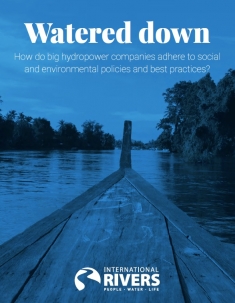Press Release | World's largest hydro companies persist in failing the environment, community rights
Chinese corporations dominate hydro industry, fall short of meeting accepted international standards.
OAKLAND, CA – A new report by International Rivers finds the world’s largest hydropower corporations fail to meet basic social and environmental standards in preparing and constructing new dams
‘Watered Down’ provides an in-depth look at how policy meets practice in seven flagship dam projects spanning Africa, Asia, and South America from some of the world’s largest hydropower firms. The study focuses primarily on prominent Chinese state-owned enterprises – which account for two-thirds of all large dams built globally – among them Sinohydro International, PowerChina Resources, and China International Water and Electric, a subsidiary of China Three Gorges.
Through research, interviews, and site visits undertaken between 2016-19, International Rivers found:
Due diligence processes for vetting new projects is lacking.
Corporate policies fall short of accepted international social and ecological standards, such as those set by the World Bank’s International Finance Corporation.
Corporations routinely compromise social and environmental objectives and disregard their own stated policies to keep to schedule and on budget.
Public disclosure and consultation around environmental and social impact assessments is uniformly below international standards.
The implication of these failings is considerable. Dams have already fragmented two-thirds of the world’s great rivers, displaced more than 80 million people, and negatively affected over 470 million more. They’ve also been a leading culprit in the 83 percent decline in global freshwater biodiversity. That the small handful of companies responsible for building most of the world’s dams do not adhere to basic accepted practice is cause for great concern.
The study revealed several breaches of standard practice. For instance, only one of the seven projects studied made full environmental impact assessments publicly available prior to construction. In the case of the Neelum-Jhelum Dam in Pakistan, China Ghezouba began construction before a complete environmental impact assessment was even carried out.
Companies argued that such issues are beyond their mandate as construction firms, and laid responsibility for issues such as unpaid compensation for displaced communities and non-disclosure of key documents with host governments. The report emphasizes the need for companies to insist upon adherence to internationally-accepted standards to prevent adverse impacts, but also to protect companies’ reputations.
“If companies want to be considered standard-bearers in the sector, they must require that certain conditions are met before entering into a project,” said Josh Klemm, report co-author and policy director at International Rivers. “Basic steps like requiring disclosure of impact assessments, or foregoing projects that would impact UNESCO sites, should be non-negotiable.”
The report also found that companies routinely overlooked what should have been major red flags. Huaneng pushed forward with the Lower Sesan 2 hydropower project in Cambodia despite widespread protests and opposition from communities. In another example, China International and Water and Electric accepted a contract to build the Isimba Dam on the White Nile in Uganda, despite the fact that the reservoir would submerge important protected areas.
“Certain projects simply should not be built, owing to their irreversible impacts on endangered species, violations of indigenous peoples’ rights, or because of the acute risk of impoverishing displaced communities,” said Klemm. “Companies must embed proper due diligence in how they evaluate potential projects, even if it means passing on potentially profitable business opportunities.”
This ongoing issue has been brought into stark relief after Sinohydro won bids to construct dams in some of the world’s most sensitive ape habitats in Guinea and Indonesia, and another located within the Selous Game Reserve in Tanzania, a biodiversity hotspot for African wildlife and UNESCO World Heritage Site.
While such concerns predominate the report’s findings, its recommendations do chart a way forward. The performance of the companies in the study begs not only for hydro companies to adopt enforceable standards for dam construction in line with international best practice, but for a greater shift in the energy portfolios of corporations to more sustainable alternatives, such as wind and solar.
The report and its findings owe to the input and cooperation of experts and partners in the countries of the projects reviewed as well as representatives from the corporations profiled. For the full report and others on the theme of corporate accountability, visit www.HydroScoreCard.org or www.InternationalRivers.org.
- Nick Guroff, Publicist, International Rivers (nguroff@internationalrivers.org) 617 784-4753
- Josh Klemm, Editor, International Rivers (jklemm@internationalrivers.org) 202 492-8904



